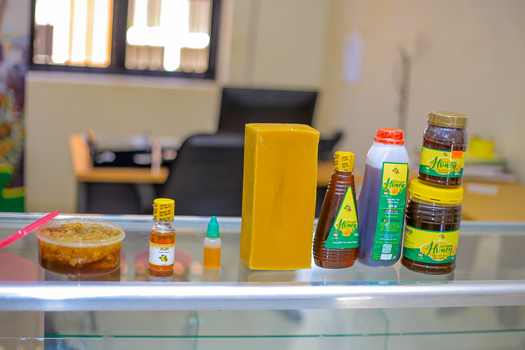Our dual key investment series features stories of our investments from our investments.
Honey Pride Arua (U) Ltd.’s (HPA) business model is an “inclusive business model” where rural communities are included at various stages in the value chain. Most importantly, Honey Pride has included the rural farmers / beekeepers as their major suppliers of honeycomb for processing into honey products – i.e., honey, bees wax and propolis. The company is deliberately targeting the youth and women to join this enterprise for sustainable livelihood. HPA has used the funds from the START Facility to improve its honey processing capacity by purchasing modern equipment and purchasing more honeycomb for processing.
With the technical assistance and seed capital support from UNCDF, Honey Pride has accomplished the following:
- Purchase of modern equipment including electronic honey press for separating liquid honey from the honeycomb, eight honey settling tanks with capacity of 1,000kgs each and honey filtering equipment.
- Increased its working capital majorly for purchase of honeycombs from the bee farmers.
- Increase in output from 3.5 tonnes before the investment to 5 tonnes after the investment per month. This is an approximate increase in monthly income by $8,384.
This investment is being featured by Deus Tirwakunda , START Facility Manager

Figure 1 An employee using a manual honey press to extract liquid honey before packaging at Honey Pride Arua

Female employee measuring honey into a jar at the Honey Pride Arua processing factory
• What made you enthusiastic about this investment?
HPA’s investment model of directly working with farmers by creating partnership with Uganda Micro Finance Support Centre (MSC) to provide funding to initially 938 farmers in West Nile sub-region to acquire beehives and equipment made the project unique and worth supporting to improve the processing capacity and working capital. The bee farmers supported have since increased to 1,762. Out of the 1,762 farmers currently engaged 16% of them are female while 34% of them are youth. These farmers produce honey comb which is sold to HPA for processing into different honey products for local consumption and export to neighboring areas of DRC and South Sudan. This has created employment for women and youth in the West Nile sub-region and improved livelihoods.
• What were the challenges faced by this project?
The most challenging aspect of the project was access to finance for growth and expansion of its honey processing capacity by acquiring a Honey Press, Honey Filtering Machine, Settling Tanks and Working Capital. Although private finance options are available the interest rates are too high, sometimes reaching 25% per annum. Through the Support to Agricultural Revitalization and Transformation (START) facility, we were able to support HPA to prepare required documentation for financing including designing the financial model and project information memorandum to facilitate the project financing at affordable rate of 10% with a grace period of up to one year.
Like many other MSMEs, the project had numerous capacity gaps that were identified initially during due diligence by UNCDF. The company was subjected to pre-investment BDS support by UNCDF to help address the gaps. HPA demonstrated its willingness to make the necessary adjustments in terms of operational, managerial, production, regulatory and financial management changes in order to grow into a market leader of honey in the region. It engaged with Uganda National Bureau of Standards (UNBS) to ensuring its honey products are certified and adhered to UNBS codes and regulations. HPA set up financial management controls that ensured money coming in (loans, grants, honey sales) and money expensed (salaries, loan repayment, purchase of honey) is utilized and captured appropriately. The team demonstrated cohesion and was keen on growing the Honey Pride brand. With all the improvements the company made, it was recommended for full proposal development.
• What are the lessons learned from this example?
As one of the first MSME to successfully go through the START facility’s pre-investment BDS programme and qualify for proposal development and financing, HPA re-enforced UNCDF’s belief and strong resolve to expand and scale up pre-investment BDS support to MSMEs that failed to qualify for proposal development. From 12 MSMEs subjected to pre-investment BDS in the 1st call for proposal, it was scaled up to cover 50 MSMEs during the 2nd call for proposal. Many other MSMEs (10) have since qualified to proceed to proposal development and funding as a result of pre-investment BDS support. We learnt that it was possible with the commitment of the project developer to address gaps and challenges preventing MSMEs from accessing finance.
Deus Tirwakunda is the START Facility Manager at UNCDF, a blended finance facility under the food security and nutrition component of Development Initiative for Northern Uganda (DINU) Program.
Prior to joining UNCDF, Deus worked with Kilimo Trust for over 10 years rising from Accountant position to be the Director for Finance & Administration. He previously worked as a Senior Auditor - Kazibwe, Kenneth & Steven Certified Public Accountants.
Deus is a CPA and a member of the Institute of Certified Public Accountants of Uganda, holds a Master’s Degree in Financial Management (Amity University) and a Bachelor of Arts (Makerere University).
for more information please contact him :deus.tirwakunda@uncdf.org


